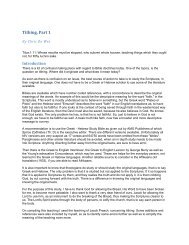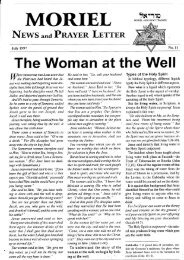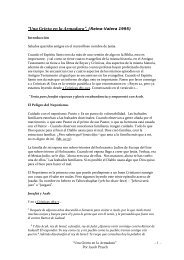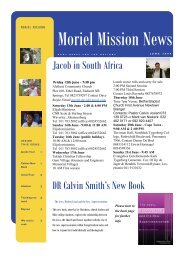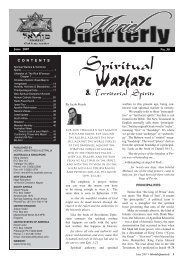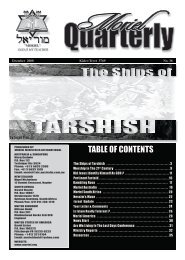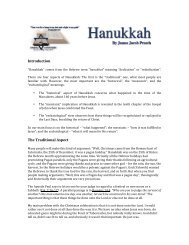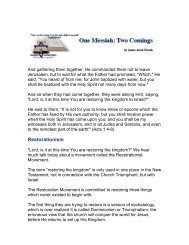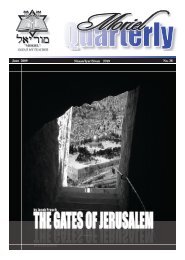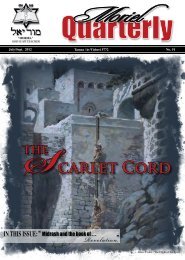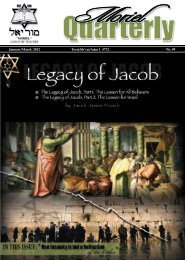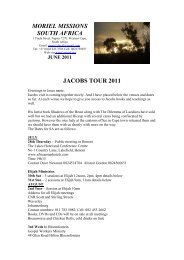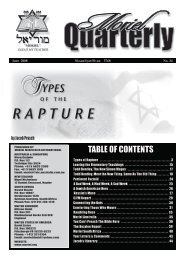The Wedding Feast (~19.49) - Moriel Ministries
The Wedding Feast (~19.49) - Moriel Ministries
The Wedding Feast (~19.49) - Moriel Ministries
Create successful ePaper yourself
Turn your PDF publications into a flip-book with our unique Google optimized e-Paper software.
Special Interest – Continued<br />
that we may live before Him.<br />
For His resurrection to be our resurrection,<br />
His death must be our death, and so<br />
Simon walks behind Him. It says “after”<br />
Him. “Pick up your cross and follow Me”<br />
(Mt. 10:38; 16:24). “My burden is light”<br />
(Mt. 11:30). He did the real work and we<br />
are simply called to carry the cross. He<br />
had to be nailed to it.<br />
Pick up the cross! Crucify the old nature!<br />
Crucify the old man! Crucify the old<br />
woman, the old creation (Ro. 6:6)! Pick up<br />
your cross and follow Me! If someone is<br />
guilty of it, crucify it and follow Me.<br />
Yes, we have another name. Your<br />
name may be “Jack,” your name may be<br />
“Jill,” your name may be “Harry” or “Harriet,”<br />
but no matter what your name is,<br />
your name is also “Simon of Cyrene.” If<br />
you are a true Christian, pick up the cross.<br />
<strong>The</strong> Corporate Solidarity of<br />
the Thieves<br />
But then we have yet a third corporate<br />
solidarity that is very important, and<br />
we read about it in the same chapter at the<br />
crucifixion.<br />
One of the criminals who were hanged<br />
there was hurling abuse at Him, saying,<br />
“Are You not the Christ? Save<br />
Yourself and us!” But the other answered,<br />
and rebuking him said, “Do<br />
you not even fear God, since you are<br />
under the same sentence of condemnation?<br />
And we indeed are suffering<br />
justly, for we are receiving what we<br />
deserve for our deeds; but this man<br />
has done nothing wrong.” And he<br />
was saying, “Jesus, remember me<br />
when You come in Your kingdom!”<br />
And He said to him, “Truly I say to<br />
you, today you shall be with Me in<br />
Paradise.” (Luke 23:39-43)<br />
This is important: We are ALL thieves;<br />
we are ALL liars; we are ALL murderers.<br />
I am a thief; I am a liar; I am a murderer.<br />
<strong>The</strong> Bible says if someone covets something,<br />
if they desire that which belongs to<br />
another, then in the eyes of a holy, perfect<br />
God, they have stolen it. If we lust after<br />
someone’s wife, lust after someone’s husband,<br />
or want to sleep with somebody<br />
other than the one we are married to, as far<br />
as God is concerned we have already committed<br />
adultery just because we wanted to<br />
do it (Mt. 5:27-28). We are all adulterers;<br />
we are all thieves; we are all liars. Because<br />
we have hated somebody without cause<br />
we are ALL murderers (Mt. 5:21-26).<br />
Sometimes when I watch Fox News and<br />
I see the political corruption in the world<br />
and the hypocrisy and the media and the<br />
Muslims, I experience a spiritual battle not<br />
to get angry. I hate the sin, not the sinner. I<br />
remember that apart from the grace of Jesus<br />
I would be no better. We are ALL murderers.<br />
As it says in the book of Job and in<br />
the book of Lamentations, nobody has any<br />
reasons to complain. <strong>The</strong>re are those who<br />
may have gotten a really rotten deal out of<br />
life; I am sorry about that. It is tough. But<br />
no matter what happened to them, no matter<br />
how unjust it is, because we are sinners<br />
in the eyes of God we have no reason to<br />
complain about how crummy our life is.<br />
Jesus was the only one who had no sin and<br />
He got the worst deal of all. He was totally<br />
innocent, but He did not complain, He uttered<br />
not a word (Acts 8:32). <strong>The</strong> rest of<br />
us can really kvetch – whine, complain; He<br />
did not do that. And so we have a third corporate<br />
solidarity: the thieves, or as we put<br />
it the “good one” and the “bad one.”<br />
One person on the cross says, “Jesus,<br />
You are the Messiah – get us out of this<br />
mess!” He only wanted Jesus to do something<br />
for him in this life, in this world.<br />
<strong>The</strong>re are people like that. <strong>The</strong>y are quite<br />
happy to profess to be Christians, or come<br />
to Jesus, or put their hands up to respond<br />
to an altar call, or to come forward at an<br />
evangelistic meeting as long as they think<br />
Jesus is going to do something for them in<br />
this life or this world.<br />
I do not suggest Jesus cannot and does<br />
not do things for us in this life and in this<br />
world. He certainly does, but that is not<br />
what it is about. <strong>The</strong>re are Christians who<br />
know nothing but a prison cell. I sometimes<br />
teach in Indonesia in Banda Aceh where<br />
they are under Sharia law and the Christians<br />
are persecuted, where Christians are<br />
martyred. <strong>The</strong> only thing Jesus gives them<br />
is a martyr’s crown. Yet remarkably they<br />
are not complaining.<br />
<strong>The</strong> “good” thief says, “Look, no matter<br />
what happens to me, I know my sin; Jesus<br />
had none. Please remember me in Your<br />
kingdom.”<br />
Both of them called out to Jesus, but<br />
with what motive? <strong>The</strong>re is somebody who<br />
calls out to Jesus simply because they want<br />
a free ticket, a good life in this world, and<br />
they are missing the whole point. On the<br />
other hand the “good thief” is someone<br />
who calls out to Jesus, saying, “I know<br />
what I am, I know how no good I am, and<br />
I know how totally good You are. Please<br />
remember me in Your kingdom.”<br />
We are all thieves, so the question is do<br />
we want to be a “good” one or a “bad” one?<br />
A “good” thief is not one who does not get<br />
caught; a “good” thief is one who knows he<br />
deserves to get caught and that Jesus wants<br />
to forgive him anyway.<br />
Corporate Solidarities<br />
After the Resurrection<br />
<strong>The</strong>se are corporate solidarities, but<br />
these corporate solidarities go beyond Jesus’<br />
crucifixion; they come into play after His<br />
resurrection. And so at this time of year we<br />
read in the following chapter of Luke an incredible<br />
story. This narrative tells us something<br />
that in so many ways encapsulates so<br />
much of what the Christian life is meant to<br />
be, but which few of us really understand.<br />
And behold, two of them were going<br />
that very day to a village named Emmaus,<br />
which was about seven miles<br />
from Jerusalem. And they were talking<br />
with each other about all these things<br />
which had taken place. While they<br />
were talking and discussing, Jesus<br />
Himself approached and began traveling<br />
with them. But their eyes were<br />
prevented from recognizing Him.<br />
“<strong>The</strong>ir eyes were prevented from recognizing<br />
Him.”<br />
And He said to them, “What are these<br />
words that you are exchanging with<br />
one another as you are walking?”<br />
And they stood still, looking sad. One<br />
of them, named Cleopas, answered<br />
and said to Him, “Are You the only<br />
one visiting Jerusalem and unaware<br />
of the things which have happened<br />
here in these days?”<br />
Again, it is important to understand<br />
that this was the period between Pesach and<br />
the <strong>Feast</strong> of Weeks. Both Pesach and the<br />
<strong>Feast</strong> of Weeks – Passover and Pentecost<br />
– were pilgrim feasts. Jews had to come<br />
from other regions to celebrate it in Jerusalem.<br />
So if they were able to, they would<br />
simply stay in Jerusalem instead of going<br />
all the way back where they came from,<br />
and then turn around and come back again.<br />
<strong>The</strong>y would just stay there. <strong>The</strong>re had been<br />
a lot of people visiting so that the population<br />
swelled. It might be compared to a resort<br />
where the population expands during<br />
the holiday season and then shrinks again<br />
when the holiday season – vacation time –<br />
is over. That is the way it would have been.<br />
And He said to them, “What things?”<br />
And they said to Him, “<strong>The</strong> things<br />
about Jesus the Nazarene, who was a<br />
prophet mighty in deed and word in<br />
the sight of God and all the people,<br />
and how the chief priests and our rulers<br />
delivered Him to the sentence of<br />
death, and crucified Him.<br />
Notice the culpability of the religious<br />
establishment. Well, please take note: then<br />
it was the Sanhedrin, today it is the Vatican<br />
Curia and the World Council of Churches<br />
– they are still crucifying Him.<br />
“But we were hoping that it was He<br />
who was going to redeem Israel. Indeed,<br />
besides all this, it is the third<br />
day since these things happened.<br />
14 <strong>Moriel</strong> Quarterly • December 2009




